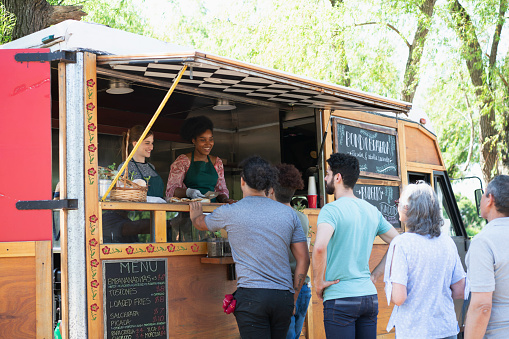From the outskirts of rural communities to the heart of metropolitan hubs, you can find food trucks selling everything from gourmet French crepes to authentic Thai street fare. Becoming a food truck owner might be the perfect fit for you if you have a passion for serving your neighborhood, value being your own boss, and don’t have a lot of money for startup costs. If you are thinking of launching a food truck business, this guide is for you.
Startup Costs
The initial investment needed to launch a food truck business depends on various factors. There are also one-time expenses and location-specific costs.
Examples of one-time startup expenses include purchasing the food truck, advertising, website design and legal fees. And then, there are recurring expenses for salaries, leasing equipment, credit card processing, and even gas.
Funding Options for Your Food Truck Business
Acquiring funding for a food truck business can be challenging. Create a sound business plan first. Good personal and business credit increases your chances of getting a business loan.
Funding can come from a variety of places, including:
- Community sponsors
- Opening a business credit card
- Crowdfunding
- Personal investors like family and friends
Create a Food Truck Business Plan
It is essential for food truck owners to create and maintain a business plan. A good business plan should incorporate these elements:
- An executive summary
- Company description
- Market analysis
- Organization and management
- Service or product line
- Marketing and sales
- Funding request
- Financial projections
- Appendix
Finding a Food Truck for Sale
There are several resources out there to help you find a food truck, including
- Local online classifieds
- National online classifieds
- Leasing and franchising
- New custom trucks
Pros of a Food Truck Business
- Business ownership: Several tax advantages come with owning your own business
- Freedom: You’ll have complete control of menu items, events to vend at, employees, etc.
- Mobility: You’ll be able to bring your business to different locations
Cons of a Food Truck Business
- Time: Long hours are the norm
- Competition: You will likely have a lot of competition
- Ordinances and zoning: Each location has different rules
Food Truck Permits and Ordinances
It’s crucial to research the various areas you are considering and the necessary permits and regulations. Some things to consider include the following:
- Food safety
- Seller’s Permit
- Zoning and parking
- Vehicle license
- Fire certificates
- Employee Identification Number (EIN)
- Business permits and licenses
Bottom Line
Once everything is in order, running a food truck business can be fun. Create a business plan with a full analysis of your projected costs if you want to start a food truck business. Once you have a budget, you can apply for financing.

